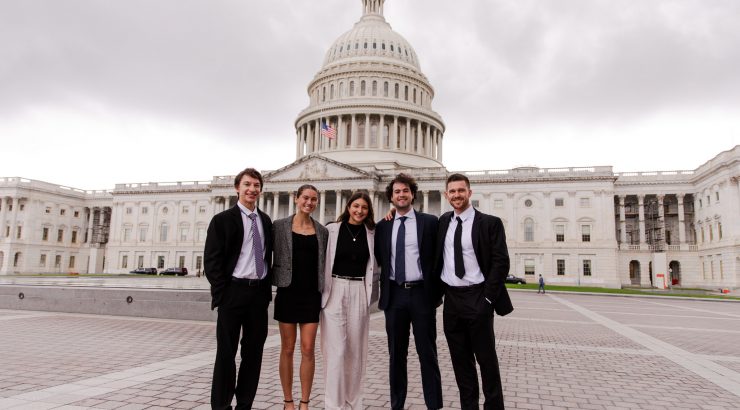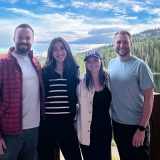The Film that Led to Freedom How Dodge College students helped one man come home
March 30, 2025
Max Karpman was given 15 minutes to make a difference: to expose how American teacher Marc Fogel was unlawfully detained in prison — five thousand miles from his home and family.
Karpman, who graduated from Dodge College last May, was a senior in the school’s Community Voices program, a fully funded documentary course that gives students the opportunity to travel the world to produce a short film. The film assignment was meant to expose students to the fundamentals and social issues of documentary production, but Karpman had a bigger goal in mind.
He knew this was the perfect opportunity to shed light on Fogel’s circumstances. The result was the 15-minute documentary Did You Forget Mr. Fogel? which played a role in the American’s release in February after nearly four years.
His situation was infuriating. Fogel, a Pennsylvania native, had lived in Russia for more than eight years, teaching history at the now-defunct Anglo-American School of Moscow with his wife Jane. In 2021, as he landed at the Moscow airport for his final year of teaching, Fogel was detained for carrying medical marijuana and later sentenced to 14 years of hard labor in a Russian penal colony.
In telling Fogel’s story, Karpman drew inspiration from his own childhood experience. He had attended the Anglo-American School of Moscow, where Jane Fogel taught him science.
“I knew all about Marc Fogel,” Karpman says, “everyone in school did. He was the best teacher at our school. He taught my sister, and all of my friends.”
As the film’s director, Karpman was paired with three other students to help bring his vision to life. At the time, he only knew the film’s editor, Seth Karall ’24. However, the entire team, joined by Kaylee Smith, now a senior, Franny Hill ’24, and cinematographer Matthew Meredith, developed a strong bond over the course of filming.
Associate Professor Sally Rubin, who oversees the Community Voices program, saw the team’s chemistry and potential from the start.
“Their commitment from the very beginning to making a film that could really make a difference in someone’s life was so clear,” Rubin says. “They really, really wanted to help bring Marc Fogel home, and the film did that.”
The team first met at a coffee shop to get to know each other, then threw themselves into the diligent work of telling Fogel’s story.
“We didn’t have an exact plan on how we wanted to tell it, but we knew it was so important, and we felt connected with Marc and his situation,” Karall says.
The filmmakers decided the best place to film would be Pittsburgh, Penn., where they would be in contact with the Fogel family.
“We wanted to make a story that was inviting to viewers and made them empathize with Marc and his family,” Karall says.
Their goal was to capture the essence of Fogel, and so they filmed most of the scenes in his hometown. The documentary begins with images of his community chapel and the bright yellow clock that sits on his family’s wall — each signifying a piece of home that he missed while in prison.
“Emphasizing that this is where he grew up…and just displaying that lifestyle was really key to showcase what he was missing out on while he was stuck in prison,” Smith says.
The students were under a tight schedule in their five-day Pittsburgh trip, spending eight to 10 hours each day gathering film. Their nights were filled with long production meetings, mapping out what they would accomplish the next day.
Interviews with Fogel’s family members became extremely emotional and intimate. Karpman says that the more he learned, the more he became motivated to finish the film.
“We saw firsthand how broken this family [was], how devastated they [were], how tortured they felt this whole time,” he recalls. “It was just the most raw, human vulnerability.”
Before they knew it, Hill, Karpman, Karall and Smith had all become emotionally invested in the story.
“We became so ingrained in this family’s situation, just because of how close we became with them,” Hill says. “The family just really trusted us.”
From former students to family members, the team struggled to fit countless tender testimonies into just 15 minutes.
“The hardest part was just the emotional toll that this took on us. I wanted to be able to solve this issue for the family,” Hill says. “It was so hard feeling so powerless.”
The team filmed the week before Christmas, then traveled home for the holiday break. Hill was struck by the fullness of her family, given the empty seat at the Fogel’s table.
“After that, I thought about Marc every single day,” Hill recalls. “I never separated myself from the story. It became part of all of us.”
In addition to launching a social media campaign to spread awareness, the production team screened their film on Capitol Hill in the summer of 2024 for senators and other government officials. They hoped the film would result in bureaucratic efforts to get Fogel home.
“They showed it to people who were instrumental in getting Mark Fogel on that wrongfully detained list,” Rubin says. “They were aiming for political eyeballs.”
The documentary premiered on YouTube on Christmas Day 2024; in early in February 2025, Karpman got a call from Anne Fogel, Marc’s sister.
“‘We know that they shaved him, they gave him new clothes. But don’t get your hopes up. This has happened before. This could be a hoax,’” Karpman recalls her saying.
Did You Forget Mr. Fogel? screened at the Santa Barbara International Film Festival on Feb. 10. Audience members were moved to ask what they could do to help bring Fogel home.
“I said, ‘I have no idea. Like, it could happen in a year. It could happen tomorrow. You just don’t know…’ — and then it happened tomorrow,” Karpman remembers.
The next day, news articles flooded the students’ inboxes. Fogel was free following diplomatic negotiations between the United States and Russia.
“We saw ripples and changes that were happening in the political climate,” says Smith. “It was really great to see that everything we worked for, everything we aimed to do, came to fruition.”
The Fogel family thanked the students for spreading awareness. They knew the film contributed to Marc Fogel’s release.
Now that he’s back, Hill, Karpman, Karall and Smith agreed they want to film another documentary capturing Fogel’s whole journey — as soon as he is willing to talk about it.
“It’s like a fairy tale that it all actually happened,’ Karpman says, “because people really came together and saved his life.”
_________
TOP: The filmmakers in Washington, D.C. From left: Seth Karall, Kaylee Smith, Franny Hill, Max Karpman and cinematographer Matthew Meredith
Did You Forget Mr. Fogel? is available on YouTube.
Correction: The article has been updated to reflect that Fogel was detained when he landed in Moscow.


